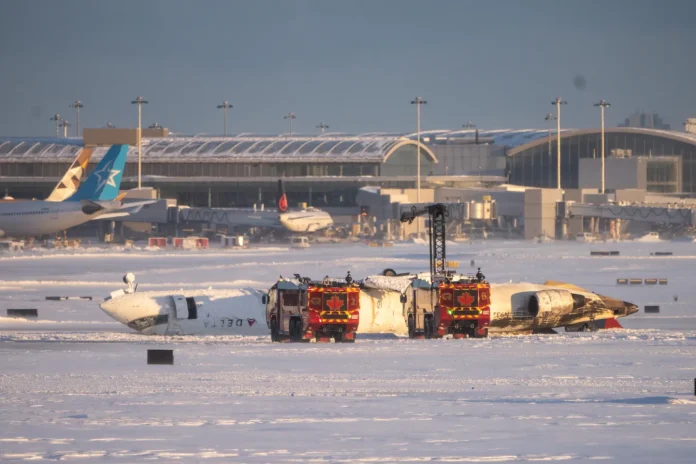The aviation world was shaken today as a Delta Airlines plane crashed in Toronto, raising concerns over air travel safety. The incident has prompted immediate investigations by aviation authorities, as officials work to determine the cause and assess the situation. This article provides an in-depth analysis of the crash, including potential causes, passenger safety, emergency response, and expert insights.
The Incident: What Happened?
According to initial reports, the Delta Airlines aircraft, which was scheduled to land at Toronto Pearson International Airport, encountered severe difficulties before crashing. While details are still emerging, eyewitnesses reported seeing signs of distress moments before the plane made an emergency descent. The aircraft, carrying passengers and crew, was on its final approach when it reportedly lost control, leading to the crash.
Passenger and Crew Safety
The primary concern following any aviation accident is the safety of passengers and crew. Emergency response teams arrived swiftly at the scene, providing medical assistance and evacuation support. As per the latest reports, there have been injuries, but authorities have yet to confirm the extent and whether there were any fatalities. Several passengers were transported to nearby hospitals for treatment.
Potential Causes Under Investigation
Authorities, including the Transportation Safety Board of Canada (TSB) and the Federal Aviation Administration (FAA), are working to determine the cause of the accident. Some possible contributing factors include:
- Weather Conditions: Toronto has been experiencing fluctuating weather conditions, and poor visibility or turbulence could have played a role.
- Mechanical Failure: Any potential faults in the aircraft’s engine, hydraulics, or control systems are being examined.
- Pilot Error: Investigators will analyze the flight recordings to determine if human error was a factor.
- Bird Strike or External Factors: Mid-air collisions with birds or foreign objects can lead to catastrophic damage.
Emergency Response and Rescue Efforts
Toronto’s emergency response teams demonstrated efficiency in handling the situation. Firefighters, paramedics, and police coordinated efforts to control the damage, assist injured passengers, and prevent any further risks. Additionally, airport operations were temporarily halted to ensure proper management of the crisis.
Impact on Airline Operations and Air Travel
The crash has resulted in disruptions to Delta Airlines’ operations. Flights to and from Toronto have been delayed or rerouted as authorities conduct investigations and clear the wreckage. Passengers scheduled to travel with Delta Airlines are advised to check with the airline for updates regarding their flights.
Statements from Delta Airlines and Authorities
Delta Airlines released an official statement expressing deep concern over the incident, ensuring full cooperation with the investigation and prioritizing passenger welfare. The airline has set up emergency helplines for affected families and is working with authorities to determine the cause of the crash. Canadian aviation authorities have assured the public that a thorough investigation is underway.
Aviation Safety and Future Measures
This crash has reignited discussions on aviation safety and the need for enhanced protocols to prevent such incidents in the future. Some critical areas under review include:
- Enhanced Aircraft Maintenance: Ensuring rigorous inspections and maintenance procedures to prevent mechanical failures.
- Improved Pilot Training: Strengthening pilot response strategies for emergency situations.
- Advanced Weather Monitoring: Utilizing more sophisticated technology to predict and avoid hazardous weather conditions.
- Passenger Safety Regulations: Reviewing emergency evacuation procedures to enhance survival rates in accidents.
Expert Opinions on Aviation Safety
Aviation experts stress that while flying remains one of the safest modes of transport, incidents like this highlight the importance of continuous improvements in technology, training, and crisis management. According to an aviation analyst, “Every accident provides valuable lessons that help make air travel even safer. Investigators will use this data to implement stronger safety protocols moving forward.”
The Delta Airlines plane crash in Toronto has left many concerned about air travel safety. While investigations continue, authorities are working tirelessly to uncover the cause of the crash and ensure passenger safety remains a priority. The aviation industry will undoubtedly learn from this incident, strengthening measures to prevent future accidents.
Also Read – Delhi CM Swearing-In Ceremony Scheduled for February 20




